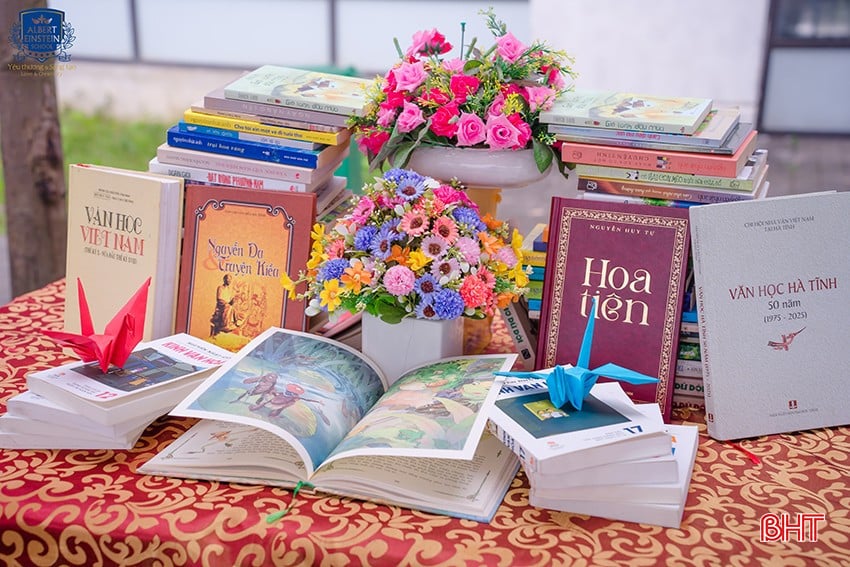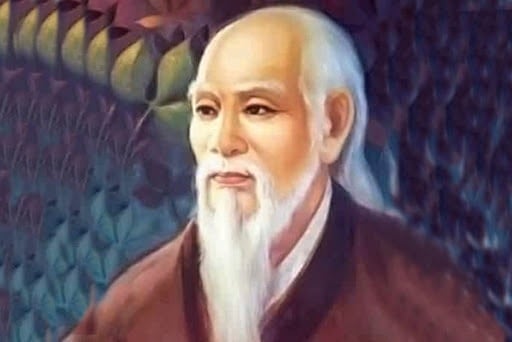I still remember when I was a child, every time I went to a used bookstore with my father, I was extremely excited. The smell of yellowed paper, the piles of books, the worn pages…, all created a special and attractive space that I could spend hours exploring.
During the years working away from home, the gifts my father sent to my sisters and I were always books. Every time we received letters and gifts from him, we cheered and competed to read them first. Until now, I still remember the fragrant smell of paper emanating from it. It has become an important part of my childhood, so every time I smell that scent, my heart is filled with longing, my eyes sting and I want to cry.
Later, when I went to the capital to study at university, I still kept the habit of reading books every day... (Illustration photo from the Internet).
I grew up with books like that. Later, when I went to the capital to study at university, I still kept the habit of reading books every day. On weekends, I took the opportunity to visit old bookstores on Lang Street. Somewhere on Ba Trieu Street, there was a tiny old bookstore but many generations of students knew it for two reasons: one, the store had many rare books, and two, the owner was very arrogant. He could be irritable, ready to refuse to sell books to buyers just because they asked questions that he considered unnecessary.
I used to spend days lying down all day reading Murakami Haruki’s “The Wind-Up Bird Chronicle,” feeling lost in a world that was both vague and profound, and summer nights reading Nguyen Ngoc Tu’s “Endless Field,” my heart filled with pity for the innocent yet painful lives of people. Sometimes I would lie down reading Doan Minh Phuong’s “And When Ashes Fall” until late at night, vaguely thinking about love and loneliness in the hearts of modern people. Those pages not only brought aesthetic emotions but also opened doors that helped me understand more about myself.
But then one day, I realized that I had gradually abandoned the habit of reading every night. Every day, then every week, the books on the shelf were no longer flipped open as often as before. They were replaced by phones, tablets, with news flashing across the screen in seconds.
Instead of reading paper books, they turn to e-books, audiobooks, or even in-depth articles on online platforms... (Illustration photo from the Internet).
It is easy to see that nowadays, in coffee shops, people “communicate” with their phones more than ever. Browsing Facebook, TikTok, YouTube, it seems that young people are indifferent to everything else, including books. I myself am also caught up in the flow of social networks with countless attractive things. Sometimes it is not necessarily because of the attractive things, but because of the highly entertaining things, harmless but making people waste their free time or boredom. And sometimes I suddenly wonder: is reading culture gradually disappearing? Or is it just changing in a way that I have not yet realized?
It’s a fact that reading is no longer a natural priority in many people’s lives. We have so much to worry about: work, school, social media, engaging short videos, endless online conversations. Sitting down, opening a book and giving it your full attention has become a luxury. Even for me, who used to read all afternoon, there were times when I went an entire month without touching a book. Every time I tried to read, I was tempted by a new notification, a trending video, or simply the urge to take a break with something “easier to digest.”
Books have never disappeared from my life, it's just that they're being drowned out by too much other noise...
But I also realized: books have never disappeared from my life, they are just overwhelmed by too much other noise. Before, I could spend an entire afternoon with a thick novel, but now, I read articles online, follow the news on electronic sites, even listen to audiobooks on the go. Reading has not disappeared, it is just no longer limited to traditional books. Reading culture has not disappeared, it is just not the same as before. Not many people read paper books in silence anymore, but they still read, in new ways. Some choose e-books, some listen to audiobooks on the go, some read long articles on specialized platforms, some still keep the habit of reading every night, even if it is just one chapter.
Regarding literary books, recent studies have shown that short stories and novels are more popular with readers than other genres such as poetry, memoirs, etc. Most readers choose literary books to read based on inspiration, because they like to read, only a few read out of habit. The purpose of reading is mainly for entertainment, relaxation and to improve knowledge and understanding of life.
There are people who still maintain traditional reading habits, but many people also access knowledge through new means. Instead of classic literary works, they choose skill books, comics or self-help books. Instead of reading paper books, they turn to e-books, audiobooks, or even in-depth articles on online platforms. They not only read but also share and discuss what they read on social networks, in book-loving groups. With online literary works, where the compositions are posted in parts and the writer waits for the opinions and participation of readers, they even interact, promote the endings in the way they want, becoming co-authors. This is also one of the advantages of online literature when it expands the role of readers, encourages their imagination and creativity, making them no longer passive readers.
Albert Einstein Primary, Secondary and High School (Ha Tinh City) organized the program "Reading in the digital age".
Another challenge of modern reading culture is competition with other forms of entertainment. Readers are more likely to be drawn into short videos and quick content than to take the time to read slowly. When there is so much to read, reading becomes a less desirable option.
That is why the trend of fast reading, short reading, and thin books has become popular. In addition, comics are also popular because they are easy to read, quick to read, and easy to understand. A long article can be ignored, but a concise article with condensed content attracts many people. I do not deny the convenience of this, but at the same time, I am also worried that we are gradually losing the habit of deep reading - a habit that helps us to reflect and understand the problem more comprehensively.
I’ve tried reading on my phone and tablet, but it doesn’t feel as complete as holding a real book. I get distracted by notifications on the screen, and sometimes just skim through without really thinking about it. But I can’t deny that reading e-books has many advantages: I can store hundreds of books in a compact device, and can read anywhere, anytime without worrying about the weight of thick books.
One of the things that worries me the most is the change in the way we access information. When everything can be looked up on Google in seconds, do we still have the patience to read a book with hundreds of pages just to understand a problem? I have fallen into this spiral too. There were times when I did not want to read a long book and just looked for a summary online. But then I realized that reading a summary can never replace the experience of actually reading a book in depth. It is like watching a movie through the introduction, you can know the main content but cannot feel the depth of the story.
Audio-visual media such as television, online newspapers, e-books, etc. have clearly changed readers' reading habits. However, I have asked many people and learned that they still prefer to hold a book in their hands to read. I myself am the same, although I do not maintain it as often as before, but every time I hold a printed book to read, I still feel more relaxed than reading on a phone or iPad.
I can touch each letter on it, read and re-read a passage. I can fold the edge of a page to mark it, even use a colored pen to underline or highlight a passage that needs to be remembered or re-read. I can imagine the real stories behind the dedications at the beginning of books bought at used bookstores, imagine some loving fathers who saved money to buy it for their children, some readers who enjoyed the book and then gave it to their best friends, or some new writer who was both shy and eager to write a dedication to a newly published book for a writer of the previous generation...
There will always be a part of today's generation, and tomorrow's, that will cherish the moments spent with a book...
The pages of this book that have been turned, the emotions that have settled here, the lives that have continued on this page…, all of these things make me emotional when I hold an old book in my hand. And when I open the newly bought books to be the first to read them, I think that one day my friends, my children will continue to turn these fragrant pages, they will cry, they will laugh like me now. That thought makes me really happy.
Books are still there, we just need a little effort to find them in our busy lives. I learned to reorganize my time, read less but regularly. I choose books that move me, not necessarily heavy, just enough to keep me with the pages longer. I turn off my phone notifications when reading, creating quiet spaces for myself.
I know that reading culture still exists, not in the superficial form of social media trends, but deep below that noisy surface. It still exists in people quietly reading books in a crowded coffee shop, in the soft sound of pages turning on the bus, in the small corners of old libraries that are still frequented.
And I also believe that there will always be a part of today’s generation, and even tomorrow’s, that still cherishes the moments spent with a book. There will always be fathers working far from home who send their children gifts containing a book, carefully and beautifully wrapped. There will always be little girls and boys like me who eagerly wait and open that gift with a shout of joy, always as if it were the first time they received a gift. As long as we do not let the habit of reading slip away, the culture of reading will never disappear. It is only growing and changing, just like us and like life itself.
Source: https://baohatinh.vn/van-hoa-doc-trong-thoi-dai-so-post286260.html







![[Photo] Bus station begins to get crowded welcoming people returning to the capital after 5 days of holiday](https://vstatic.vietnam.vn/vietnam/resource/IMAGE/2025/5/4/c3b37b336a0a450a983a0b09188c2fe6)

![[Photo] General Secretary To Lam receives Sri Lankan President Anura Kumara Dissanayaka](https://vstatic.vietnam.vn/vietnam/resource/IMAGE/2025/5/4/75feee4ea0c14825819a8b7ad25518d8)

![[Photo] Vietnam shines at Paris International Fair 2025 with cultural and culinary colors](https://vstatic.vietnam.vn/vietnam/resource/IMAGE/2025/5/4/74b16c2a197a42eb97597414009d4eb8)















































































![[Video]. Building OCOP products based on local strengths](https://vstatic.vietnam.vn/vietnam/resource/IMAGE/2025/5/3/61677e8b3a364110b271e7b15ed91b3f)




Comment (0)